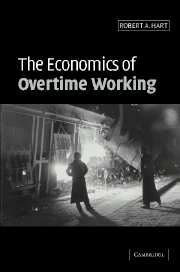Book contents
- Frontmatter
- Contents
- List of figures
- List of tables
- Preface
- 1 Overview
- 2 Facts and figures
- 3 The overtime decision
- 4 The overtime premium
- 5 Overtime hours and empirical studies
- 6 Overtime pay and empirical studies
- 7 Policy issues
- 8 Is overtime working here to stay?
- References
- Index of names
- Index of subjects
3 - The overtime decision
Published online by Cambridge University Press: 22 September 2009
- Frontmatter
- Contents
- List of figures
- List of tables
- Preface
- 1 Overview
- 2 Facts and figures
- 3 The overtime decision
- 4 The overtime premium
- 5 Overtime hours and empirical studies
- 6 Overtime pay and empirical studies
- 7 Policy issues
- 8 Is overtime working here to stay?
- References
- Index of names
- Index of subjects
Summary
In this chapter, we investigate the decision to work overtime hours in the workplace. The literature has explored this issue from three different perspectives. These are (a) the overtime supply choice of the individual, (b) the firm's demand for overtime, and (c) worker-firm contractual bargaining agreements over hours of work. Within all three approaches, it is common to accommodate interventions by outside agencies – usually the government, but including industry-level agreed rules and regulations – that effectively impose exogenous constraints on the practice of overtime working. It should be emphasised, however, that supply-dominated studies almost invariably embrace aspects of demand while demand analysis is often extended to admit some degree of supply-side decision making.
Suppose we were to concentrate on an individual's decision to supply hours of work. In the case of overtime, the question arises as to the role played by the wage premium for hours worked in excess of standard hours. This typically involves considerations that lie beyond the usual supply analysis of a participating individual. Leaving aside possible mandatory rules in respect of overtime compensation, payment of a premium for a sub-set of daily working hours implies action by an agent to provide an incentive to work longer hours than would have been the case with only a single rate. It suggests overt intervention to induce, for part of the working day, a substitution effect that overwhelmingly dominates the income effect.
- Type
- Chapter
- Information
- The Economics of Overtime Working , pp. 43 - 80Publisher: Cambridge University PressPrint publication year: 2004
- 1
- Cited by



